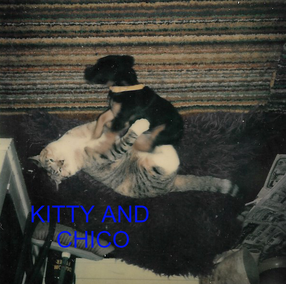
Today is the third anniversary of the death, passing, transition of my soul-dog Blake.
It doesn’t seem like three years ago. It seems like yesterday. Today I have one year old Perry, the Border Collie who is doing a fine job of filling Blake’s boots as brand ambassador and those are big boots to fill. So I go easy on the little guy and don’t expect too much.

Blake wasn’t my first pet loss. My first devastating loss was Kitty, my tortoiseshell cat I had when I was twelve. Before that we had several family cats die, but they weren’t mine and I didn’t have a big connection to them.
Kitty was my best friend and a pretty comical cat. She was my first rescue you might say, when she followed me home from school one day when I was ten. Her whiskers had been cut off so I knew she wasn’t being treated right. My sisters and I hid her for a few days in a neighbour’s house until we came clean and fronted up to our parents that I had technically stolen this little waif of a kitten. They soon relented and let me keep her.

Sadly, Kitty had a short life and after we moved to the country, she was caught in a disgustingly barbaric rabbit gin trap and lost her leg. She bled to death. This event and the life of this cat marked a major moment in my life. It was when I became aware of animal cruelty and began a lifetime campaigner of animal rights and protection.
Kitty was a surrogate mother to my first dog Chico. He was bought from a pet shop for my eleventh birthday. He must have had Pug in him. He was undershot and a little black and tan ball of fun. I taught him how to play soccer and Kitty taught him to wrestle and washed him like a good Mum. The three of us had a short, but glorious time together.
Chico was hit by a car when I was fourteen. I came home from school to hear that he was chasing our cat, his new buddy Scrap, across the road and was killed instantly. Scrap saw what happened and never came back to the house to us. Later, I saw him once in our orchard. He’d gone feral, never trusting humans again. So I lost two pets that day. This lesson taught me for the future as an adult, to always secure my property with fences.
Pet grief IS the same as human grief
For many, losing a pet can be the same as the grief experienced when we lose a family member. Where the pet is the source of love, company and connection, the void left by their passing can leave us feeling overwhelming sadness, isolation and loneliness. This is how it was for me as a teenager losing Chico. My friends didn’t understand how Chico was my strongest relationship, and before him, Kitty. I was a sensitive kid from a big family. My mother gave me a sleeping pill that night. I didn’t cope well for a long time.

The bonds we make with animals can be profound and give us joy and companionship. Some people don’t associate grief and loss with the passing of a pet. They don’t recognise this grief as affecting you deeply. Or they expect it to pass quickly. Friends or family, who have been supportive in the past, may expect you to be over the death of your pet a lot quicker than how you are travelling with this deep emotion. You may end up feeling betrayed, angry, and withdrawn. Everyone’s experience of grief for a pet is different, with no right or wrong response.
Here are some tips to help you cope in your time of grief:
- Remember to allow yourself to be sad and feel the grief. It is a natural emotion and part of the rhythm of life.
- Honour your pet’s role in your life. Plant a tree or a rose bush, a plaque in a pet cemetery, or a photo, a collar or piece of jewellery that holds some significance. (I have a silver necklace that was used as a bling collar for several of my Samoyeds.)
- Stay healthy, exercise, sleep and be kind to yourself.
- Connect with those who understand your loss. Some communities have pet bereavement support groups so check with your local council. Even some of the Lifeline counsellors will be animal lovers. If you are overwhelmed and unprepared, at least they can point you in the right direction to pet loss support groups. There are many groups on social media whether spiritual, religious or not who have members who want to hear your story. No post is too long in a warm, caring community. Your words about your beloved pet are important to their healing too.
- Understand the symptoms of grief and loss, especially unfounded guilt, so you can recognise what you are experiencing and seek support when needed.
- Be prepared for good days and bad days. It does get easier over time.
